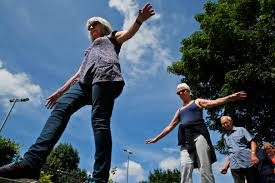A great night at Victorian Facilitators’ Network (VFN) this week, exploring deliberative democracy. VFN is fertile soil for us Victorian facilitators with seeds sown, watered and nurtured month by month. There is no membership, just a place for everyone. VFN is a curiosity and generosity driven network that builds professional skills.
The deliberative democracy night was led by the inimitable Michelle Howard of Collaborations. Michelle revealed herself as a huge fan of Geoffrey Robertson. Yes, she has the Hypothetical mojo for sure!
Michelle set up the deliberative democracy hypothetical ‘in-the-round’ of our VFN circle. The problem focus? A contentious facility in a northern Melbourne suburb undergoing rapid change. The stakeholders? Ward councillor, council manager, seniors (the current facility custodians), and a range of culturally diverse groups.
Kimbra White of Mosaic Lab and Bruce Turner were the expert consultants on the deliberative format they term ‘Citizens’ Panels’.
Michelle invited people to the stakeholder roles, ‘I’m sure Joyce of the Senior Citizens is in the room’. My word she was! All played their roles convincingly, drawing on knowledge and experience of communities and councils.
The hypothetical was followed by discussion.
Dynamics I’ve often seen in scoping deliberative projects came up in the hypothetical scenario. For example between ward councillor and council manager, and councillor and consultants.
Councillors can feel that they are letting down the democratic side if they allow others to play a role that effectively influences decision-making. In addition, they are concerned about those community members who regularly have decision-makers’ attention. They understand and respect these people (even if they are a little too vocal). A random stratified sample may be promising because it brings in ‘everyday people’ but surely well known stakeholders won’t be overlooked? I’ve written about the way this plays out in ’Usual suspects threatened by participatory budgeting’.
The consultants and council manager did a great job of speaking for the silent majority as Stephen Mayne has done as a brilliant advocate for deliberative projects.
Nonetheless, there was a lot of discussion about the degree to which inclusion in deliberative processes is truly inclusive. Arabic and Indigenous stakeholders said: our community members would not feel comfortable joining in as lone and unsupported jury members.
I remembered my experience with the Richmond Residents Citizens’ Panel. This jury included people from Africa, China, Vietnam, the Middle East, Latin America and Indonesia as well as old time Melbourne-ites, teenagers, young mums, seniors and everyone in between. However a decision was taken not to include people who would require interpreters.
The evening highlighted that deliberative forums are a really hopeful option in today’s political climate. Yet one person felt strongly that citizen despair would be fuelled if a deliberative forum’s recommendations were shelved
Finally it’s impossible to overstate the importance of the scoping phase. The evaluation of a training program we conducted for the Victorian Local Government Association, Nuts and Bolts of Participatory Budgeting, showed that councillors, executive and officers alike were challenged by Council’s task in realistically scoping the deliberative remit. Firstly participants said it’d take a lot for key internal stakeholders at their council to join forces to define a jointly owned problem. They saw the political dimension of gaining agreement of senior executive and councillors as pretty challenging. Finally they identified the need for culture change so that a council could comfortably ‘partner with the community’ as is required for deliberative processes.
Nonetheless identified the value of the methodology for getting a genuine community view on:
- Council Plan
- Community Planning
- Capital works and council assets
- Community thinking about trade offs
If you require guidance, advice or mentoring at the scoping stage, do get in touch.

